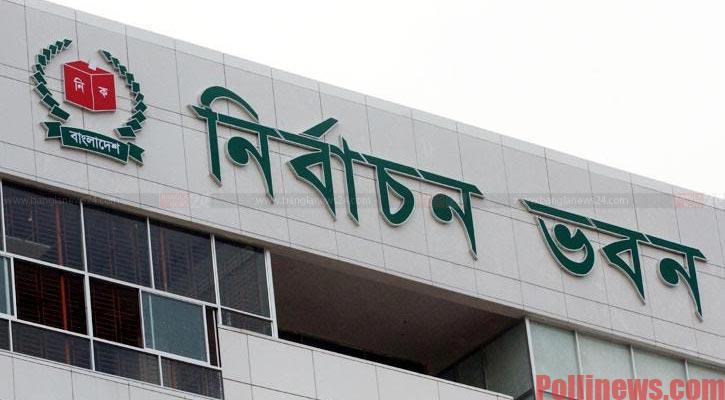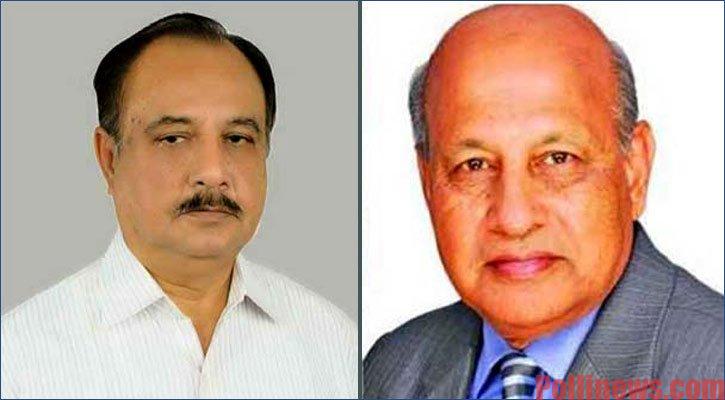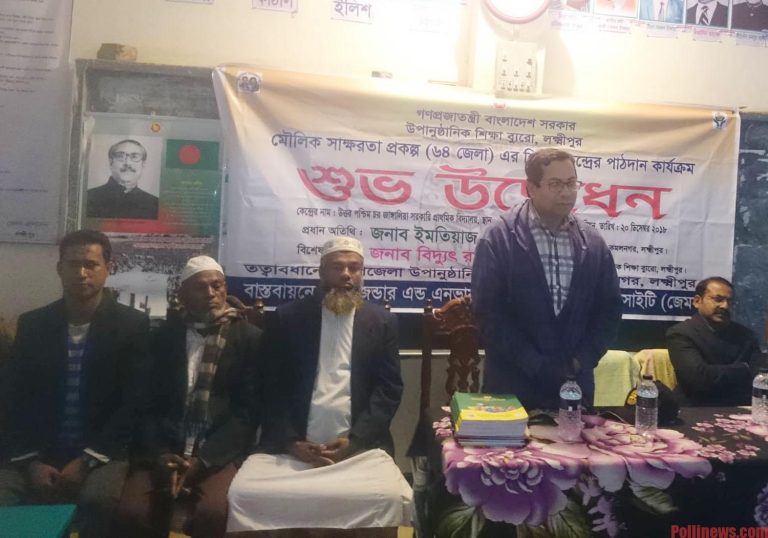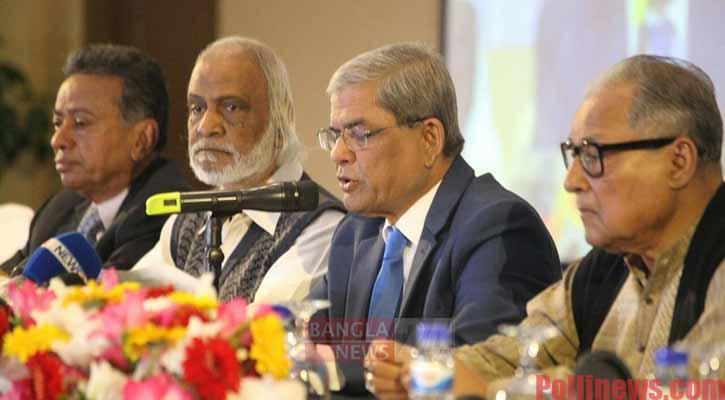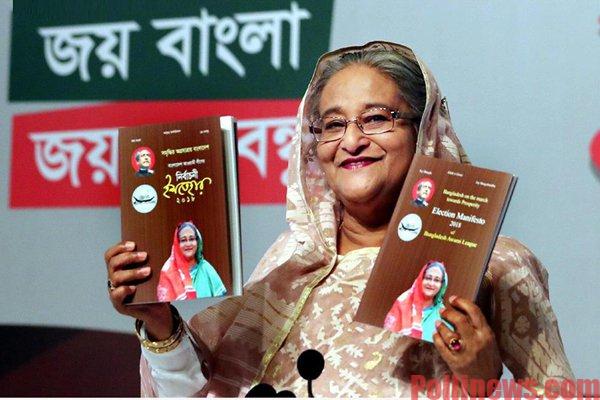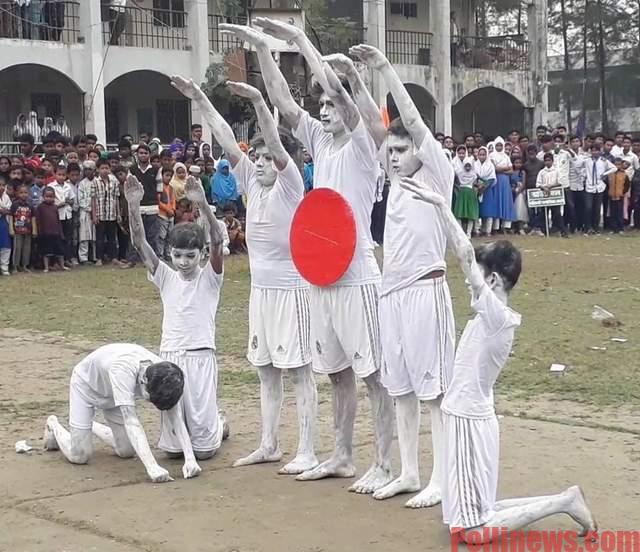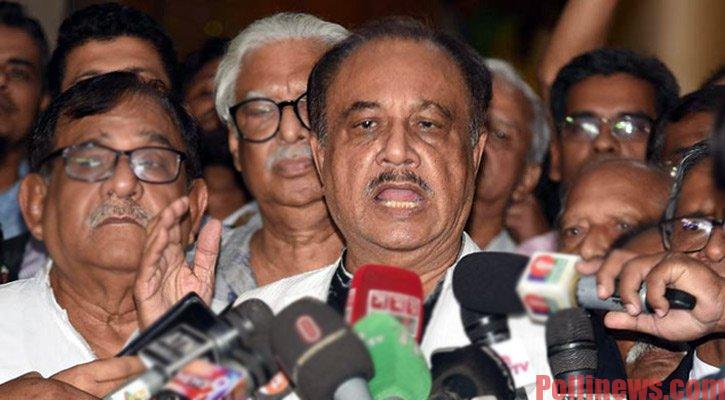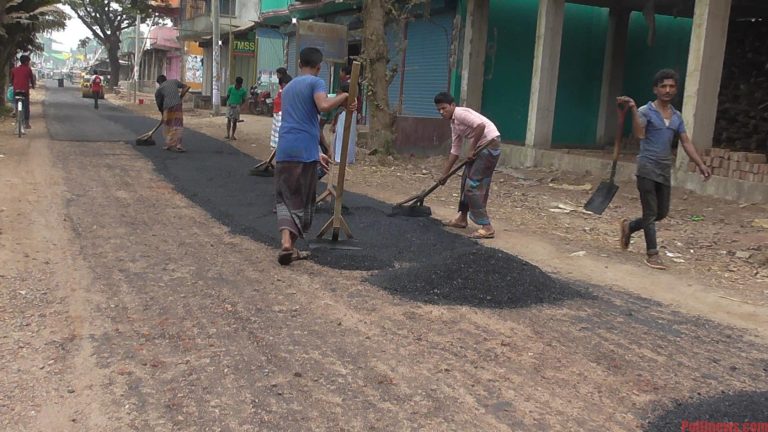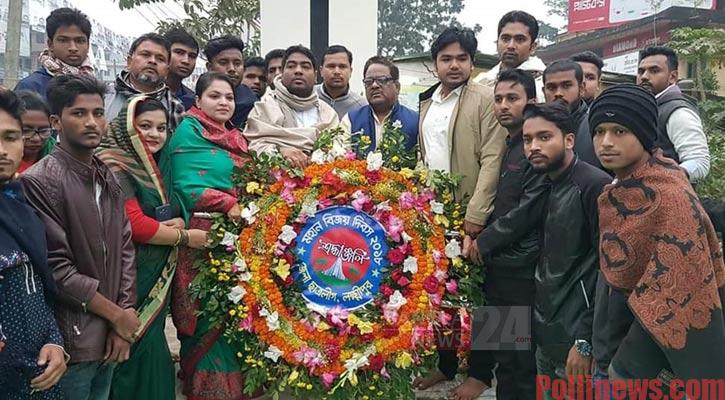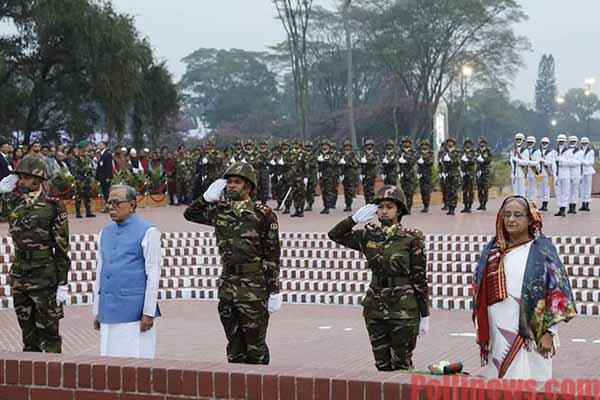BNP has promised to spend 5 percent of GDP on education and 5 percent on health if it comes to power. The party has promised not to give opportunities to foreign policy that threatens other countries. The manifesto also talks about amending the constitution to transfer the control of the lower courts from the hands of the President to the hands of the Supreme Court.
BNP Secretary General Mirza Fakhrul Islam Alamgir announced the manifesto at Hotel Lakeshore in Gulshan in the capital on Tuesday (18 December) at 11:30 am. He read out the manifesto on behalf of the party's chairperson, Khaleda Zia, who was imprisoned.
BNP Standing Committee member Dr. Abdul Moin Khan, Nazrul Islam Khan and Amir Khosru Mahmud Chowdhury.
In the manifesto, democracy and rule of law, judiciary, freedom of expression have been emphasized in 19 points. Other 19-point issues emphasized in the manifesto include—decentralization of power, economy, freedom fighters, youth, women and children, education and employment, energy, information and technology, sports and culture, foreign and expatriate welfare, agriculture and industry, health and medical, defence. and police, housing, establishment of pension fund and rationing fund, environment, foreign affairs and minorities and minority communities.
BNP has prepared the manifesto for the 11th National Assembly elections in the light of 'Vision 2030'. The manifesto of the party has been prepared on the occasion of the election keeping in mind the slogan 'Move forward together, vote in the grain of rice'. The complete manifesto of BNP has been presented.
Democracy and rule of law
1. BNP will make election day democracy a daily practice.
2. The necessary amendments to the Constitution will balance the powers of the President and the Prime Minister in the executive power of the Republic.
3. Provision will be made not to have a prime minister for more than two terms in a row.
4. The constitutional obligation of the Prime Minister, along with the Cabinet, to be accountable to Parliament will be ensured.
5. The Deputy Speaker will be appointed from the opposition party.
6. By amending Article 70 of the Constitution, the right of parliamentarians to free expression will be guaranteed conditionally.
7. The 'Upper House of the National Parliament' will be established involving people from different classes and professions. The democratic rights of the people will be restored by reintroducing the 'referendum' system in the constitution.
8. Significant representation of women in all constitutional institutions will be ensured.
9. The National Assembly will be made the focal point of all national activities.
10. A government system will be developed to conduct the elections so that there is no repeat of the agrarianization of power. The nature of this supervisory system will be determined in the light of past problems and for this purpose transparent dialogue will be held with all political parties.
11. A national commission will be formed to reach a new social contract to establish a future-oriented political culture against the politics of vengeance and revenge. The members of this commission will be the leader of the government party in the parliament, the leader of the opposition party and respected national personalities.
12. It will be ensured that there is no recurrence of one-party rule.
13. A culture of tolerance will be encouraged to curb offensive criticism of national leaders.
14. The functioning of the administrative machinery, police and institutions of the state shall be ensured by relying only on honesty, skill, talent, ability, patriotism and judicial power, without regard to individual's creed and party loyalty.
15. An 'Ombudsman' will be appointed as per the Constitution to ensure administrative transparency and accountability.
16. Accountability of law and order forces including RAB will be ensured. Additional armed police battalions will be formed by changing the current structure of RAB. This battalion will be under the Ministry of Home Affairs. All military and civilian institutions and organizations of the state shall be governed by their respective charters.
17. All forms of lobbying and extortion in employment and admission to educational institutions shall be prohibited and shall be treated as a punishable offence. There will be no time limit for conditional entry into government service except for Defense, Police and Ansar.
18. All inquiry reports related to BDR murder and theft of Bangladesh Bank reserves will be released and further investigation will be initiated.
19. Special measures will be taken to ensure that the general public does not suffer during the movement of the President and the Prime Minister.
20. Assets of the Prime Minister, Ministers, MPs and senior government officials will be published annually.
21. Traffic congestion on roads will be put to an end and appropriate measures will be taken to reduce road accidents.
22. All measures will be taken to control corruption.
Department of Justice
1. By amending Article 116 of the Constitution, the control of the lower courts will be transferred from the hands of the President to the hands of the Supreme Court.
2. Competent judges will be appointed and institutional arrangements will be made to clear the backlog of cases.
3. A Judicial Commission will be constituted to reform the present judicial system.
Freedom of expression
1. Freedom of expression will be ensured. Even if there is disagreement with the government, no one's voice will be suppressed. By removing online monitoring, people will be given the opportunity to speak and express their opinions freely.
2. Digital Security Act, Official Secrets Act and all other laws will be repealed. The RTI Act will completely remove existing barriers to speed up access to information.
3. End extrajudicial killings, disappearances, murders and inhumane physical and mental torture to establish the value of human life.
4. The Special Powers Act 1974 will be repealed.
5. Political leaders shall have free right to reasoned criticism.
Decentralization of power
1. The responsibility of the development activities of the country will be in the hands of the elected local government.
2. Instead of spending 5 percent of the budget through the local government at present, it will be increased at the rate of 5 percent every year and at least 30 percent of the budget will be spent through the local government in five years.
3. Zilla Parishad will be elected by direct vote of the people.
4. City government will be introduced in municipal areas with all service agencies under the mayor.
5. Commissions will be formed to reorganize the administrative structure in public welfare and determine the level of local government.
the economy
1. The national economic growth rate will be increased to 11 percent.
2. The export growth rate will be tripled. Export products will be diversified.
3. In light of the bitter experience of share market, bank and social security fund looting, qualified, honest and efficient persons will be appointed in the Securities and Exchange Commission and the Board of Directors of State-owned Banks so that no one can commit such corruption in the future. Political interference in bank operations will be stopped. By abolishing the Banking Division of the Ministry of Finance, the management and supervision of state-owned banks will be entrusted to the Central Bank.
4. No ongoing development projects will be stopped. However, organized corruption in mega projects will be investigated and the culprits will be brought to justice.
5. The committee will be formed to review the projects rushed in the last two years of the current government.
6. All foreigners working in the country will be covered by work permits to prevent money laundering and bring them under tax.
7. A task force will investigate the reasons for the high cost of the rental power project.
freedom fighter
1. Corruption will be eradicated in the name of declaring all freedom fighters as 'honorable citizens of the state' and preparing a list of freedom fighters. In view of price inflation, the allowance of the martyred freedom fighter's family will be increased.
2. Monuments will be built to protect the memories of the liberation war scattered all over the country and mark the slaughter grounds and mass graves during the liberation war. An accurate list of the martyrs of the Liberation War will be drawn up on the basis of an intensive survey by the state initiative and they will be given due status and state recognition.
Youth, women and children
1. Participation of youth, women and children in national development will be ensured.
2. A Youth Parliament will be constituted to protect the interests of the youth up to the age of 25 years.
3. BNP will directly involve women society in all activities for the bright future of the country. All obstacles to the implementation of this process will be removed.
4. The development of women in the field of sports will be sponsored.
5. Strict and effective legal measures will be taken to prevent women abuse, dowry system, acid throwing, sexual harassment, rape, trafficking of women and children. Effective practical steps will be taken to prevent child labour.
6. Government and private initiatives will be taken to build more day care centers so that women can concentrate on their work while keeping their children.
7. In order to provide more encouragement to women entrepreneurs, necessary support in project proposal formulation, low-interest bank loans and tax exemptions will be provided.
8. Unemployment allowance will be paid to the educated unemployed for a period of one year or till employment, whichever is earlier. Financial assistance will be given to their rational economic initiatives.
9. Women will be given equitable inheritance of property. Existing laws conflicting with this objective will be examined.
Education and employment
1. 5 percent of GDP will be spent on education.
2. Higher education will be rich in excellence in knowledge, science and technology. Emphasis will be placed on subject-oriented education, training and research. A world-class university will be built.
3. A separate education channel will be launched on National TV to improve and expand the quality of education.
4. More opportunities will be created to learn Bengali language as well as English and other foreign languages to add a new dimension to the world talent world and international labor market.
5. Low interest education loans will be introduced for students from low income families.
6. A special fund will be created to provide scholarships to the meritorious to facilitate the acquisition of the highest degree from reputed universities abroad.
7. By ensuring the election of student parliaments in all universities and higher education institutions, including Dhaka University, the way to develop future leadership from among the students will be facilitated.
8. Madrasa education will be made more modern and up to date. Their curriculum will include various vocational and vocational subjects.
9. Respective 'honorary allowances' will be introduced for mosque khatibs, imams and muezzins at the upazila and ward levels based on specific policies.
10. All kinds of legal, remedial and institutional measures will be taken to prevent the chaos created in the education sector and the collapse of the education system due to the leakage of various examination papers.
11. All types of VAT will be waived from the students. All cases brought against students affected by anti-VAT, quota reform and safe roads movement will be withdrawn and compensation will be given to the victims of these movements.
12. Seats will be reserved for poor meritorious students in government and private educational institutions. PEC and JSC examination system will be abolished.
13. In the first three years, two lakh people will be given jobs in government jobs based on merit and merit in a corruption-free system.
14. A 20-year loan will be introduced for young couples and entrepreneurs to become self-sustainable.
15. One crore new employment measures will be taken in the next five years.
16. Unemployment allowance will be paid to the educated unemployed for a period of one year or till employment, whichever is earlier. Financial assistance will be given to their rational economic initiatives.
fuel
1. Steps will be taken to modernize and rehabilitate inefficient old power plants on an urgent basis. Dependence on domestic gas and furnace-oil will be gradually reduced. In order to permanently solve the power crisis and reduce carbon emissions, various steps will be taken including the establishment of small, medium and large eco-friendly power plants, as well as renewable energy extraction, especially solar energy, wind energy, geo-thermal, ocean waves, biogas, electricity generation from waste.
2. Major power plants, reservoirs, gas extraction and supply industries will be set up in the public sector and as necessary public/private joint ventures.
3. Electricity and residential gas prices will not be increased in the first year of assuming power. All discrepancies in electricity and gas prices will be removed.
Information and Technology
1. All kinds of unreasonable barriers will be removed in bringing money earned from abroad in the information and technology sector. Global Payment Gateway will be offered at low charges to facilitate all those involved in freelancing and outsourcing.
2. Nationwide Telecommunication Transmission Network (NTTN), Internet Service Provider (ISP) and International Internet Gateway (IIG) markets will be opened up. This will create competition, increase efficiency and reduce Internet costs.
3. Research and investment in the manufacturing sector of augmented reality, animation and robotics will be encouraged. The START UP FUND and IT Innovation Fund and Venture Capital will be encouraged to develop information technology solutions for the local problems of the country.
4. The government will focus on using indigenous technologies to develop cloud based enterprise applications to fully implement e-Government within five years.
5. By opening up the VoIP system, open competition will be provided in this sector.
6. The intellectual property rights of the creative person will be guaranteed. Local companies will be assisted in execution of international contracts and not just sub-contracts. At the same time local companies will be encouraged to use locally developed software. IT incubator and laboratory facilities will be added to each university with acceleration funds.
7. Internet infrastructure development will ensure timely high-speed internet for mobile data and affordable broadband in the fastest possible time.
8. Zero duty facility will be maintained on all types of materials used in information and communication technology.
9. Metropolitan areas, municipalities, all educational institutions and other administrative centers will be gradually transformed into smart cities, smart municipalities, smart villages and smart campuses.
Sports and Culture
1. Planned and effective steps will be taken to make Bangladesh an acceptable place on the world map in several fields of sports within the next 5 years. A state-of-the-art sports academy will be established in every district to achieve international standards in sports.
2. Countercultural practices contrary to national ideology will be discouraged. Democratic norms will be followed for fair reflection of independent thought and ideologies through culture.
Foreign and Expatriate Welfare
1. Expanding foreign employment, ensuring risk-free migration and establishing good governance in migration management. Remittance sending system will be developed with sufficient number of exchange houses/banks with incentive facilities so that expatriates can remit their hard earned income to Bangladesh through legal channels. It will be ensured that Bangladeshi embassies abroad play their due role in the welfare of expatriate Bangladeshis especially expatriate workers.
2. Harassment of expatriates at the airport will be stopped. Various projects will be undertaken for the welfare of expatriates returning from abroad by preparing a proper list.
3. Expatriate Bangladeshis will be given the opportunity to vote in the national elections and their participation in the governance of the country will be ensured. Adequate consular assistance and financial assistance will be provided to rescue and return citizens in danger or stranded abroad.
Agriculture and Industry
1. A right combination of price-support and input subsidies will ensure that farmers get a fair price for their produce. The list of farmers eligible to receive state support will be prepared by developing a database through open discussion in every union council. Crop Insurance, Animal Insurance, Fisheries Insurance and Poultry Insurance will be introduced, albeit subsidized if necessary, to deal with various risks in agriculture.
2. Interest will be waived on agricultural loans of poor and natural calamity farmers.
3. Within two years, the minimum wage of garment workers will be increased to Tk 12,000. Accommodation will be provided by construction of multi-storied buildings for workers in all other industrial areas including garments.
4. Minimum wages will be fixed for workers in all sectors.
5. With a view to making agricultural production a profitable occupation, the price of all agricultural products will be determined through local cooperative societies, ensuring a reasonable profit with the cost of production.
6. Subsidized rationing will be introduced for rural and urban poor including laborers and farm labourers.
7. Agricultural subsidies will be significantly increased to make fertilizers, seeds and other agricultural inputs available.
8. The lease of Jalmahal and Haor will be completely canceled and made available to fishermen and poor people.
9. City slum dwellers and hawkers will not be evicted without rehabilitation.
10. Through health insurance workers will get all the medical benefits through a fixed amount of premium per month.
11. Within a year, people will be guaranteed access to safe food free of adulteration and chemicals.
Health and Medicine
1. 5 percent of GDP will be spent on health. The price of medicines will be reduced at a reasonable rate ensuring reasonable profit for the manufacturer, wholesaler and retailer.
2. National Accreditation Council (Accreditation Council) will be formed with the aim of improving and controlling the quality of medical education with the combination of prominent doctors and medical educators.
3. Special health care arrangements will be made for the mentally and physically challenged and the elderly.
4. The majority of medical expenses are spent on diagnostic tests. In this case, adequate diagnostic booths will be set up under government initiative to reduce public suffering.
5. Necessary programs will be taken to solve diabetes and growth problems of children.
Defense and Police
1. An efficient, transparent, dynamic, talented, accountable contemporary and people-oriented public administration will be developed. Adequate reforms will be made in the recruitment process to ensure evaluation of merit. The quota system will be abolished except for the children of freedom fighters, women and marginalized ethnic groups. An appropriate civil service law will be framed in the light of the Constitution in keeping with the dynamic globalization. Armaments and other equipment required for defense forces will be procured on priority basis. Welfare schemes will be taken up for the members of the armed forces.
2. Accommodation problem of all ranks of officers working in armed forces will be solved in a planned way. Rational rationing system will be introduced for retired members of armed forces.
3. Risk allowance of police force will be increased. Steps will be taken to increase the professionalism of the police force. Effective measures will be taken to increase police participation in UN forces. Welfare schemes will be taken up for the police.
4. The salaries of inspectors and sub-inspectors will be upgraded within six months and ration benefits will be provided to members of the police force even after retirement.
Establishment of housing, pension fund and rationing system
1. Allowance for distressed widows and widows and destitute elderly will be increased in line with inflation. A 'Pension Fund' will be constituted through legislation to alleviate the distress of old age for those employed in the private and self-employed sectors. Rationing system will be introduced for poor and low income people.
the environment
1. Sustainable strategies will be adopted to address climate change. Appropriate measures will be taken to protect the natural environment and biodiversity of the Sundarbans and other forests including intensive afforestation across the country including coastal areas.
Abroad
1. Bangladesh's national interest will be given top priority in foreign relations.
2. BNP will not interfere in the internal affairs of any other state and will not give any space to any activities that may create security problems for any other state. Similarly, if any other country interferes in the internal affairs of Bangladesh and poses a threat to the national security of Bangladesh, strong resistance will be raised.
3. Special friendly relations with Muslim countries and neighboring countries will be strengthened. Strong bilateral and multilateral initiatives will be taken for the safe return of Rohingya refugees who have taken refuge in Bangladesh.
4. Active initiatives will be taken to consolidate and effectively develop various regional organizations including the United Nations, European Union, SAARC, BIMSTEC, BCIM, BBIN etc.
5. Initiatives will be taken to increase cooperation with various activities including BRI, Indo-Pacific Strategic Initiative.
6. The connectivity of Bangladesh with other countries will be enhanced and the connectivity of the people of West Bengal, Bihar, Tripura, Meghalaya, Nepal, Bhutan and development will be facilitated.
7. According to the international river law, the initiative of dialogue will be taken in the spirit of regional and mutual cooperation to get the fair share of the water of international rivers flowing in Bangladesh.
Small ethnic groups and minority communities
1. The lives, property, honor and dignity of the small ethnic groups in the hills and plains will be protected. All facilities in employment and education for the backward hill and plains minorities and development activities in hilly areas will be strengthened.
2. Social, political, economic and religious rights and full security of life, dignity and property will be provided to all ethnic groups regardless of party, creed, caste, religion and caste. Ministry of Religious Minorities will be established for this purpose.
